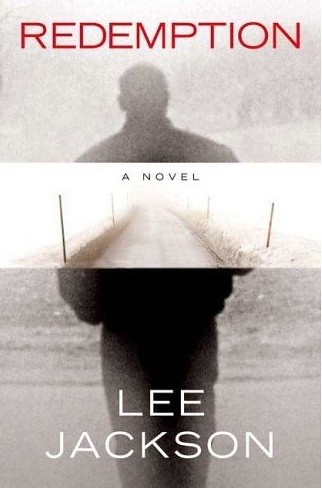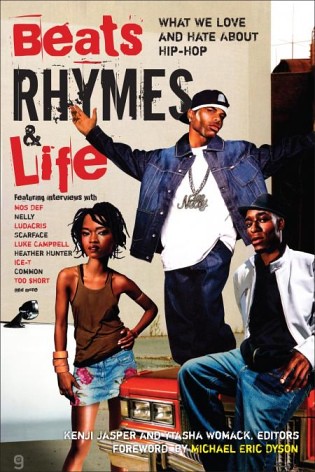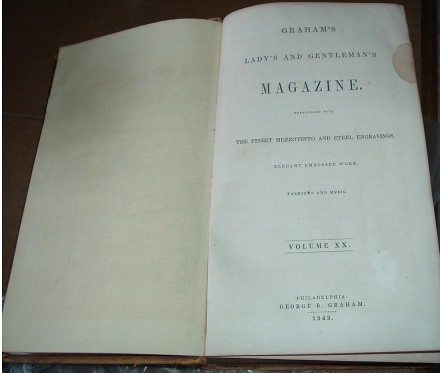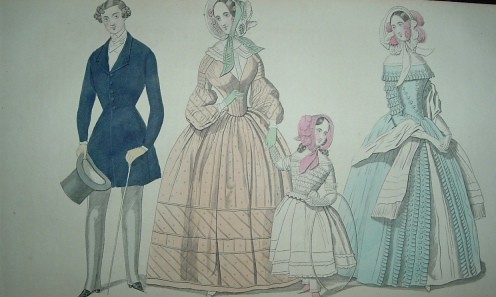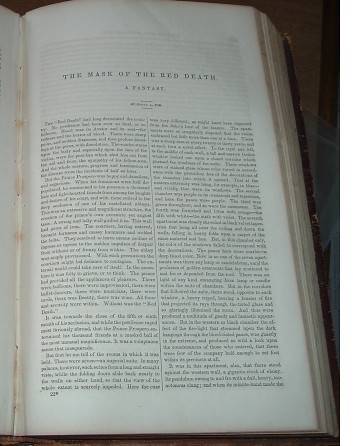The Jonathan Lethem reading I went to Friday---the closing event for this year's Fall for the Book Celebration at GMU---was a lot of fun. A staff member of the event----who (ahem) didn't introduce himself at all---opened the event by stating that Fall for the Book was about putting living writers on the same level as rock starts and using their event to give readers the chance to put a real face to the person behind the words. Lethem, in the writer-garb of the day with a sport coat, jeans and leather clogs, finally approached the stage and accepted the very first Mason Award, an award that celebrates "an author whose body of work has made extraordinary contributions to bringing literature to a wide reading public". Although no one said so, I took this as a nod to Lethem's skill at appropriating styles and themes from sci-fi, fantasy, crime fic and comic books to mainstream lit.
Lethem then launched into a reading of a short story entitled "The King of Sentences", a short story he had just finished with earlier that day. The story focuses on Clea and an unnamed narrator obsessed with words. By day they work together in a bookstore, looking down on their customers with complete disdain because they couldn't possibly understand the power and beauty of the books they were purchases with their paltry dollars. By night they read, write and pretty much achieve sexual gratification by exploring wonderfully constructed sentences. The pair decide to seek out their favorite writer, a reclusive older fellow living in upstate New York who we only know as The King of Sentences. This author reminded me a lot of J.D. Salinger, or at least what we know of Salinger: reclusive, irascible, and brilliant. It's a wacky piece and has a lot of fun with concepts like the powers of words, fandom, and the nature of a public image. I could easily see it fitting in at McSweeney's or some other equally irreverent lit mag.
Lethem stuck around for another 15 minutes or so to answer questions. I'd say about 2/3 of the audience was made of undergrads from George Mason University, many of whom recently read Lethem's novel Motherless Brooklyn for one of their literature classes. An odd choice, I thought---it does some interesting things but it's not my favorite novel of his. Anyway, several questions focuses on that novel. But other people asked him about other works, about the essay "The Ecstacy of Influence" he wrote for Harper's Magazine that attacks current laws and concepts of intellectual property, his thoughts on sci-fi, and if he sees himself as part of a "zeitgeist" of current male novelists who deal with similar subjects in similar ways (he doesn't).
I had a great time. There are still some things he said that are swirling around in my head---particularly the idea of creative influence---that I'll probably post about here after thinking on them some more. Until next time....
Excelsior
Sunday, September 30, 2007
Friday, September 28, 2007
Moving Up?
Well I guess fame of my genius is finally spreading through the ranks of the library system. The higher-ups who run the website asked me to contribute an article for the Check it out feature. Basically I write short, bullet-style reviews for 8 titles that are based around a theme of my choice. Themes picked so far are things like Affairs of the Heart, Vintage Reading, and Murder, Mayhem and Simple Curiosity. The easiest thing would probably be good horror, with Halloween coming up and everything. New trends in Fantasy could be fun as well, promoting authors like China Mieville and Jeff Vandermeer. I'll troll the stacks a bit today if I have time. I hope this is a sign of good things to come for me, because I just applied to two job openings that would give me better experience than what I'm getting now.
Tonight after work I'll be hitting the Jonathan Lethem reading, the last reading for this year's Fall for the Book. Aside from reading, Lethem's also being honored with the 2007 Mason Award, an award that celebrates "an author whose body of work has made extraordinary contributions to bringing literature to a wide reading public". I'm sorry I didn't get to go to more at Fall for the Book this year, but I'm glad I'm getting to see Lethem. He's been one of my favorite writers for several years now and I know he's a good reader of his own work----not all writers are.
Anyway, if you're there, you know who I am and you see me say hi. If you don't know who I am, just starting saying hi to everyone.
Excelsior
Tonight after work I'll be hitting the Jonathan Lethem reading, the last reading for this year's Fall for the Book. Aside from reading, Lethem's also being honored with the 2007 Mason Award, an award that celebrates "an author whose body of work has made extraordinary contributions to bringing literature to a wide reading public". I'm sorry I didn't get to go to more at Fall for the Book this year, but I'm glad I'm getting to see Lethem. He's been one of my favorite writers for several years now and I know he's a good reader of his own work----not all writers are.
Anyway, if you're there, you know who I am and you see me say hi. If you don't know who I am, just starting saying hi to everyone.
Excelsior
Sunday, September 23, 2007
Review: Redemption by Lee Jackson
Redemption is a near-future thriller, with its portrayal of a U.S. frightened enough by terrorism to cut back nearly all civil liberties, proves a fair debut for Lee Jackson. The story opens with Ben Trinity, a former college professor arrested for funding a terrorist group, hitchhiking to the west coast. Heading out to start a new job as part of his parole, a snowstorm forces him to stay the night in Redemption, Montana and miss his appointment. After getting permission from his parole officer Trinity takes a job as a handy man at a local diner. His first few days are easy; Trinity works hard and endears himself to the locals. But word leaks out about his past and what began as a simple character piece moves quickly into a political thriller. The locals fear Trinity, speak out vocally against his living there and even threatening his life. As his situation turns from bad to worse it becomes clear that Trinity is being set up to take a fall and, perhaps, even be killed by a faction within the government. The only way for him to survive is to make the truth about his past fully public and let the court of public opinion decide for itself.
As a central character Trinity moves from mysterious to likable as his innocence becomes apparent. Unfortunately, the secondary characters don’t quite have the same feel, reading more like stock character types like the closed-minded sheriff and the sweet-but-cautious love interest. There’s also odd inclusion of two short passages written in the point of view of a teen-age girl with a crush on Trinity. Kids are hard to write well, and Jackson seems to have forgotten most of what’s it like to be a teen. It’s all slang, and while teens certainly use slang they don’t sound like a walking text message. At least not yet.
SF readers will be let down a bit that the futuristic elements are confined to laws and technologies that limit the freedom of citizens in the name of government protection. While these aspects are well done, it would have been nice to see some other pieces of the future beyond what worked within his political theme. On the plus side, though, it makes this world feel very close to our own. In fact, the most haunting aspect of the novel is how close to current reality Trinity’s situation is; it’s not hard to imagine the circumstances of an innocent man’s life torn apart in the name of protecting the public.
Set in a thriller-style plot, Jackson’s fast-paced writing works in large part to get across his own political ideas. Even though I agree with his perspective on civil rights, there were many points in the story that I wanted something else to grab on to. Overall, I found this a fun read and, in some small ways, even provocative. Although it’s not likely I’ll read this one again I’ll definitely keep an eye out for his next book.
Excelsior
As a central character Trinity moves from mysterious to likable as his innocence becomes apparent. Unfortunately, the secondary characters don’t quite have the same feel, reading more like stock character types like the closed-minded sheriff and the sweet-but-cautious love interest. There’s also odd inclusion of two short passages written in the point of view of a teen-age girl with a crush on Trinity. Kids are hard to write well, and Jackson seems to have forgotten most of what’s it like to be a teen. It’s all slang, and while teens certainly use slang they don’t sound like a walking text message. At least not yet.
SF readers will be let down a bit that the futuristic elements are confined to laws and technologies that limit the freedom of citizens in the name of government protection. While these aspects are well done, it would have been nice to see some other pieces of the future beyond what worked within his political theme. On the plus side, though, it makes this world feel very close to our own. In fact, the most haunting aspect of the novel is how close to current reality Trinity’s situation is; it’s not hard to imagine the circumstances of an innocent man’s life torn apart in the name of protecting the public.
Set in a thriller-style plot, Jackson’s fast-paced writing works in large part to get across his own political ideas. Even though I agree with his perspective on civil rights, there were many points in the story that I wanted something else to grab on to. Overall, I found this a fun read and, in some small ways, even provocative. Although it’s not likely I’ll read this one again I’ll definitely keep an eye out for his next book.
Excelsior
Wednesday, September 19, 2007
Arrgh! There be pirate books on me shelf!
Arrrrgh!
In honor of Talk Like a Pirate Day, I'm listing the few pirate-related things on my bookshelf.
Under the Black Flag: The Romance and the Reality of Life Among the Pirates>. By David Cordingly.
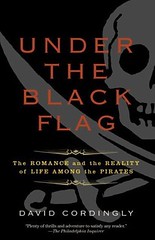
I bought this for my history buff of a grandpa, who read it and immediately gave it to me to read. Cordingly, former curator a the National Maritime Museum in England, peels away the rumors and myths of well known pirates (Captain Kidd, Blackbeard, etc) and gets at their real stories. He does an excellent job in not just dispelling the myths but also exploring them and explaining why we romanticize the very violent lives of these men none of us would like to meet in real life. For a twist, he also looks at the often ignored state supported pirates, like Sir Francis Drake. Highly readable popular history.
A General History of the Pyrates. By Daniel Defoe.

By the author of Robinson Crusoe, this 1724 classic chronicles the tales of the nutcases who sailed the seas and plundered anything they could. Although there are dozens of reprintings of this by different publishers, I really like the Dover Publications edition, put out in 1999. It comes with a useful index as well as footnotes marking things Defoe got wrong and making links to larger issues.
Isaac the Pirate Volume 1: To Exotic Lands. By Christophe Blain.

Volume 1 of an ongoing graphic novel series, Isaac is a young painter living in Pre-Revolutionary France. To make ends meet, he takes a job as illustrator aboard a ship he's told is taking cargo and passengers to America. Much to his surprise, Isaac learns that the ship's Captain---a wanted pirate with dreams of becoming a living legend---is actually taking his barge and crew farther south so he can be the first to captain to steer a boat around the South Pole. It's a nice mixture of humor and adventure, and plenty of hearty pirate speak.
Treasure Island. By Robert Louis Stevenson.

Robert Louis Stevenson described Treasure Island as "a book about a map, a treasure, and a mutiny, and a derelict ship, and a fine old Squire Trelawney, and a doctor, and a sea-cook with one leg…" and I don't think I could put it any better. This is one of the few books of my childhood that survived my bedroom fire of sixth grade; being a book I read over and over again, I'm glad it's still around.
Bluebeard. By Kurt Vonnegut.
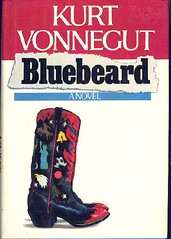
Next to Breakfast of Champions, this is probably my favorite Vonnegut novel. This story focuses on a side character that's appeared in other novels, a World War II veteran and abstract painter named Rabo Karabekian. Karabekian writes his "hoax autobiography", and Vonnegut uses it to satirize anything and everything about the art world. Why is this one in a list of pirate books, you ask? Well, I ran out of pirate books and this was the next closest. A myth of Bluebeard becomes a central theme to the story, so it's not completely out of nowhere. If you don't like it, I'll keelhaul ya!
Excelsior
In honor of Talk Like a Pirate Day, I'm listing the few pirate-related things on my bookshelf.
Under the Black Flag: The Romance and the Reality of Life Among the Pirates>. By David Cordingly.

I bought this for my history buff of a grandpa, who read it and immediately gave it to me to read. Cordingly, former curator a the National Maritime Museum in England, peels away the rumors and myths of well known pirates (Captain Kidd, Blackbeard, etc) and gets at their real stories. He does an excellent job in not just dispelling the myths but also exploring them and explaining why we romanticize the very violent lives of these men none of us would like to meet in real life. For a twist, he also looks at the often ignored state supported pirates, like Sir Francis Drake. Highly readable popular history.
A General History of the Pyrates. By Daniel Defoe.

By the author of Robinson Crusoe, this 1724 classic chronicles the tales of the nutcases who sailed the seas and plundered anything they could. Although there are dozens of reprintings of this by different publishers, I really like the Dover Publications edition, put out in 1999. It comes with a useful index as well as footnotes marking things Defoe got wrong and making links to larger issues.
Isaac the Pirate Volume 1: To Exotic Lands. By Christophe Blain.

Volume 1 of an ongoing graphic novel series, Isaac is a young painter living in Pre-Revolutionary France. To make ends meet, he takes a job as illustrator aboard a ship he's told is taking cargo and passengers to America. Much to his surprise, Isaac learns that the ship's Captain---a wanted pirate with dreams of becoming a living legend---is actually taking his barge and crew farther south so he can be the first to captain to steer a boat around the South Pole. It's a nice mixture of humor and adventure, and plenty of hearty pirate speak.
Treasure Island. By Robert Louis Stevenson.

Robert Louis Stevenson described Treasure Island as "a book about a map, a treasure, and a mutiny, and a derelict ship, and a fine old Squire Trelawney, and a doctor, and a sea-cook with one leg…" and I don't think I could put it any better. This is one of the few books of my childhood that survived my bedroom fire of sixth grade; being a book I read over and over again, I'm glad it's still around.
Bluebeard. By Kurt Vonnegut.

Next to Breakfast of Champions, this is probably my favorite Vonnegut novel. This story focuses on a side character that's appeared in other novels, a World War II veteran and abstract painter named Rabo Karabekian. Karabekian writes his "hoax autobiography", and Vonnegut uses it to satirize anything and everything about the art world. Why is this one in a list of pirate books, you ask? Well, I ran out of pirate books and this was the next closest. A myth of Bluebeard becomes a central theme to the story, so it's not completely out of nowhere. If you don't like it, I'll keelhaul ya!
Excelsior
Friday, September 14, 2007
Review: Beats, Rhymes and Life: What We Love and Hate About Hip Hop
After more than 30 years of pumping out rhythms and rhymes, there’s no arguing that Hip Hop has made a huge impact on popular culture. And much like Jazz and Rock before it, Hip Hop is now moving through the growing pains of just being a popular form of music to becoming a genuine art form with a respected place in cultural history. Editors Kenji Jasper and Ytasha Womack have done an excellent job with their book Beats, Rhymes and Life in collecting a variety of essays and opinions exploring and deconstructing the music, lyrics and imagery of the music videos surrounding Hip Hop and Hip Hop culture as they try to answer the question of its place in the world.
Several of the essays examine the image of Hip Hop and its obsession with bling, violence towards women and glorification of drugs; are the artists providing social commentary by portraying the worst of inner city life or are they adding to the problems by glorifying it? Other essays, like the forward by critic and academic professor Michael Eric Dyson, remind readers of Hip Hop’s early connections with the civil rights movement but express some regrets over its more recent developments. In fact, if there's one general thrust to most of the content of the book it probably follows Dyson's opinion that Hip Hop, by and large, was about personal artistic expression and serious commentary. The title of the book, after all, comes from an album by Tribe Called Quest, one of the more socially active Hip Hop groups around. But there's a general feeling that Hip Hop's left this behind for the glitz, bling and bank rolls it now generates by way of Mtv.
Along with the essays, the volume also includes a number of pointed interviews with well-known Hip Hop performers like Ludacris and Too $hort as well as Rob Marriot, co-founder of the Hip Hop culture magazine XXL. The interviewers are obviously well informed fans but don’t shy away from asking difficult questions. Too $hort’s interview is particularly interesting as he expresses his opinions of trends in the industry. "My personal theory” he said in the interview “is that rappers don't really lose it lyrically, they just don't pay attention to the production. That first album, when you was broke, came out the bomb, but then [with] that next one you've got some jewelry. You got a car. The girl wants you. And then you go into the studio and you got the ego and the ego can't make records. Records gotta come from within."
Despite the contributions coming from a number of academics and high-minded cultural critics, Jasper and Womack make this book accessible by keeping the hyper-critical jargon to a minimum. Readers should be aware that this is not a history of the music like Jeff Chang’s Can’t Stop Won’t Stop (Picador, 2005), but a collection of writings that assumes readers at least know the big names and events of hip hop. My own knowledge of Hip Hop is pretty limited. I know a good bit about the early days because of its connections with electronic and improvisational music. And I know the early to mid-90’s stuff, because that’s when I was in college and Hip Hop was the party soundtrack every where you went. So while I felt lost at time with the references to names of performers and albums I’ve never heard of, I still got the gist of what the writers and editors wanted to get across.
Smart fans of the art form, though, will get the most out of this. They will find a thoughtful, balanced book that gives them the opportunity to think about the medium and make their own decisions about Hip Hop’s place in history.
Excelsior
Several of the essays examine the image of Hip Hop and its obsession with bling, violence towards women and glorification of drugs; are the artists providing social commentary by portraying the worst of inner city life or are they adding to the problems by glorifying it? Other essays, like the forward by critic and academic professor Michael Eric Dyson, remind readers of Hip Hop’s early connections with the civil rights movement but express some regrets over its more recent developments. In fact, if there's one general thrust to most of the content of the book it probably follows Dyson's opinion that Hip Hop, by and large, was about personal artistic expression and serious commentary. The title of the book, after all, comes from an album by Tribe Called Quest, one of the more socially active Hip Hop groups around. But there's a general feeling that Hip Hop's left this behind for the glitz, bling and bank rolls it now generates by way of Mtv.
Along with the essays, the volume also includes a number of pointed interviews with well-known Hip Hop performers like Ludacris and Too $hort as well as Rob Marriot, co-founder of the Hip Hop culture magazine XXL. The interviewers are obviously well informed fans but don’t shy away from asking difficult questions. Too $hort’s interview is particularly interesting as he expresses his opinions of trends in the industry. "My personal theory” he said in the interview “is that rappers don't really lose it lyrically, they just don't pay attention to the production. That first album, when you was broke, came out the bomb, but then [with] that next one you've got some jewelry. You got a car. The girl wants you. And then you go into the studio and you got the ego and the ego can't make records. Records gotta come from within."
Despite the contributions coming from a number of academics and high-minded cultural critics, Jasper and Womack make this book accessible by keeping the hyper-critical jargon to a minimum. Readers should be aware that this is not a history of the music like Jeff Chang’s Can’t Stop Won’t Stop (Picador, 2005), but a collection of writings that assumes readers at least know the big names and events of hip hop. My own knowledge of Hip Hop is pretty limited. I know a good bit about the early days because of its connections with electronic and improvisational music. And I know the early to mid-90’s stuff, because that’s when I was in college and Hip Hop was the party soundtrack every where you went. So while I felt lost at time with the references to names of performers and albums I’ve never heard of, I still got the gist of what the writers and editors wanted to get across.
Smart fans of the art form, though, will get the most out of this. They will find a thoughtful, balanced book that gives them the opportunity to think about the medium and make their own decisions about Hip Hop’s place in history.
Excelsior
Tuesday, September 11, 2007
Book Displays
A few weeks ago I pitched the idea to our book display committee at work (yes, there is actually a committee for that) to do a display based around the writers attending the two big book fests in the area: Virginia's Fall for the Book at George Mason University and the National Book Festival located on the National Mall in downtown D.C.
The whole concept of displays in libraries has really changed in recent years. Once upon a time, it was a tool librarians would use to bring out so-called shelf-sitters and get people checking them out again. Nowadays it's seen more as a way to promote new material or point out that we have books or authors that are hot. This is mostly a reaction to competing with the book chains and how they display books. There's quite an inferiority complex going in within public libraries right now.
I would have thought the bookfest idea a simple idea to sell to the powers that be, but it took some convincing. Part of what they want with displays are themes that make it easy for anyone to hunt down and grab copies for restocking purposes. Since the festival displays are author-specific, it means there's a little more work involved. You can't just go to the mystery section and grab a bunch of stuff. But really, the festival display is kind of a gimme. I'll be surprised if lots of people don't look at it and pull books from it. It will have a wide variety of fiction, genre fiction, non-fiction and poetry, and mostly big names. George Mason University is a short ten minute drive from our branch and I know a good number of our patrons are going to both fests----there's hardly a week that goes by that someone does't mention one or the other to me. Really, anyone who reads should go to them if they can.
So today I submitted a partial list of authors we have books of in our branch that are in good enough shape to put on display.
Fall for the Book (9/23-9/28)
Mitch Albom
Rita Mae Brown
Alan Cheuse
Danielle Deulen
Joseph Ellis
Alice McDermott
Jennifer Egan
Jonathan Lethem
Susan Shreve
Mark Strand
National Book Festival (9/29)
David Baldacci
Ken Burns
Edward P. Jones
Thomas Mallon
Joyce Carol Oates
N. Scott Momaday
Terry Pratchett
Charles Simic
James Swanson
Gene Luen Yang
So now I have to go-ahead. It'll probably go up a few days prior to Fall for the Book starting. If I'm inspired I'll take a photo when it's up.
Now I just need to convince the committee on the local author display I want to do, which will probably be a tougher sell. But it's something I really want to do. I plan to do as much as I can (which at this point is not much) to promote and support local writers. It seems to me they are too often ignored as a great resource. At least in library system I work for.
Excelsior
The whole concept of displays in libraries has really changed in recent years. Once upon a time, it was a tool librarians would use to bring out so-called shelf-sitters and get people checking them out again. Nowadays it's seen more as a way to promote new material or point out that we have books or authors that are hot. This is mostly a reaction to competing with the book chains and how they display books. There's quite an inferiority complex going in within public libraries right now.
I would have thought the bookfest idea a simple idea to sell to the powers that be, but it took some convincing. Part of what they want with displays are themes that make it easy for anyone to hunt down and grab copies for restocking purposes. Since the festival displays are author-specific, it means there's a little more work involved. You can't just go to the mystery section and grab a bunch of stuff. But really, the festival display is kind of a gimme. I'll be surprised if lots of people don't look at it and pull books from it. It will have a wide variety of fiction, genre fiction, non-fiction and poetry, and mostly big names. George Mason University is a short ten minute drive from our branch and I know a good number of our patrons are going to both fests----there's hardly a week that goes by that someone does't mention one or the other to me. Really, anyone who reads should go to them if they can.
So today I submitted a partial list of authors we have books of in our branch that are in good enough shape to put on display.
Fall for the Book (9/23-9/28)
Mitch Albom
Rita Mae Brown
Alan Cheuse
Danielle Deulen
Joseph Ellis
Alice McDermott
Jennifer Egan
Jonathan Lethem
Susan Shreve
Mark Strand
National Book Festival (9/29)
David Baldacci
Ken Burns
Edward P. Jones
Thomas Mallon
Joyce Carol Oates
N. Scott Momaday
Terry Pratchett
Charles Simic
James Swanson
Gene Luen Yang
So now I have to go-ahead. It'll probably go up a few days prior to Fall for the Book starting. If I'm inspired I'll take a photo when it's up.
Now I just need to convince the committee on the local author display I want to do, which will probably be a tougher sell. But it's something I really want to do. I plan to do as much as I can (which at this point is not much) to promote and support local writers. It seems to me they are too often ignored as a great resource. At least in library system I work for.
Excelsior
Thursday, September 06, 2007
Happy Birthday, On the Road
Yesterday at work we had a number of patrons coming through looking for things by Keroauc. Most people came in asking for The Road, and looked really confused when they were pointed to McCarthy's post-apocolypse novel. One other person asked for Jack's Road. Even though I don't work at the official librarian desk, the librarians kept sending these people my way when they weren't sure what the people were asking for. I guess I'm starting to get a rap for odd ball lit trivia, mostly due to my kicking ass in a game of literary trivial pursuit at lunch a few weeks ago. But that's another story.
Now normally when a bunch of people are asking for an older book, it means one of two things: kids need to read it for school or a book club is reading it. These were all ranges of adults, but none were school age. After about the fifth person I finally asked why so many people were looking for Keroauc. The details were a little vague, but apparently NPR ran a feature story on him. "I think it's his 50th birthday," the patron told me. I broke the news to her that Jack was long dead, and if alive would be well over 50. She shrugged her shoulders and took the book anyway. I hope she likes it.
Still somewhat confused, I tracked down the NPR story and found that yesterday was not Jack's b-day (shocker), but the 50th anniversary of the first publication of On the Road. Although I knew the story already, it's a pretty good encapsulation of all Jack went through to get that book out. In his 30's, living at home with his mother he fought to get that book out. Sometimes I guess you just know when you write something good.
I still remember reading Kerouac for the first time. It was the summer between my Senior year of High School and my Freshman year at College. My stepbrother Jon---who's one year ahead of me in school----was reading it that summer. Not to be outdone, after all I was the book nerd, I picked up a copy and read it a few short days before heading down to JMU. I remember not fully understanding it at the time, but I also remember liking it. I remember enjoying the freedom the characters felt and loving the romantic idea of setting out an endless search for, well, something. I don't think I quite knew what at the time. Nowadays I would probably say enlightenment. Or peace.
Over the years I read more by Ol' Jack, and I have to say I prefer his poetry and his later novel Desolation Angels. But it's hard to argue with a novel that legitimized and popularized one of the most influential lit movements of the 20th century. So although it's a day late, I'll hoist a short drink of scotch tonight in honor of Jack and his lit classic On the Road. Happy 50, old bean.
Excelsior.
Now normally when a bunch of people are asking for an older book, it means one of two things: kids need to read it for school or a book club is reading it. These were all ranges of adults, but none were school age. After about the fifth person I finally asked why so many people were looking for Keroauc. The details were a little vague, but apparently NPR ran a feature story on him. "I think it's his 50th birthday," the patron told me. I broke the news to her that Jack was long dead, and if alive would be well over 50. She shrugged her shoulders and took the book anyway. I hope she likes it.
Still somewhat confused, I tracked down the NPR story and found that yesterday was not Jack's b-day (shocker), but the 50th anniversary of the first publication of On the Road. Although I knew the story already, it's a pretty good encapsulation of all Jack went through to get that book out. In his 30's, living at home with his mother he fought to get that book out. Sometimes I guess you just know when you write something good.
I still remember reading Kerouac for the first time. It was the summer between my Senior year of High School and my Freshman year at College. My stepbrother Jon---who's one year ahead of me in school----was reading it that summer. Not to be outdone, after all I was the book nerd, I picked up a copy and read it a few short days before heading down to JMU. I remember not fully understanding it at the time, but I also remember liking it. I remember enjoying the freedom the characters felt and loving the romantic idea of setting out an endless search for, well, something. I don't think I quite knew what at the time. Nowadays I would probably say enlightenment. Or peace.
Over the years I read more by Ol' Jack, and I have to say I prefer his poetry and his later novel Desolation Angels. But it's hard to argue with a novel that legitimized and popularized one of the most influential lit movements of the 20th century. So although it's a day late, I'll hoist a short drink of scotch tonight in honor of Jack and his lit classic On the Road. Happy 50, old bean.
Excelsior.
Wednesday, September 05, 2007
A Little Romance, a Big Step and an Old Book
Amidst work, going to a wedding and everything else that happened this past weekend, I managed to squeeze in something special. After dating for just over six years, I proposed to Miss L. I won't go into the full details, but we had dinner in Annapolis, walked down to the waterfront and I popped the question in a somewhat quiet spot along the water. It wasn't a surprise at all---we've been talking about it for months, so when I said we were going somewhere nice for dinner and it wasn't a special occasion it was pretty obvious. I must have done ok, though, because she said yes.
One of the growing trends these days is for the woman to give the man gift after the proposal. I've read everything from plasma tv's to ipods, but when Miss L asked me I told her it should be something more permanent and personal than that, but I didn't want jewelry. So when we got back to her apartment Miss L lit some candles and handed me a wrapped package. I opened it, intensely curious to find out what she picked for a gift. Inside I found a book, an old volume bound in worn leather. After opening to the title page, I found this:
The book holds a mixture of articles, criticism, fiction and poetry. I noticed familiar names like HW Longfellow and Mary Spencer as well as crazy pictures like these:
Finally, on page 257, I found the reason for her choice:
After a little research, I've learned that Graham's Lady's and Gentleman's Magazine was a Philly based journal known for mixing articles on art and fashion and including new works of short fiction and poetry for many writers of the day. At the time, it was one of the highest paying markets in the U.S. Poe himself worked as editor for the journal for a little over a year, and used the journal to publish and promote both his own work and work by others that he admired (Longfellow, Dickens, etc). Its pages were the first to publish Poe works like "A Descent into the Maelstrom", "The Murders in the Rue Morgue" and yes, "The Mask of Red Death".
Not exactly romantic by today's meaning of the term, it does show how well Miss L knows me. It's a wonderful choice for a gift, especially since "Masque" or "Mask" as it's called here is one of my favorite Poe stories. I've always thought about collecting old books. A couple of years ago my grandpa gave me an early printing of a collection of Ambrose Bierce stories. Placed together, the two volumes make a nice start to a collection. Hopefully Miss L and will be able to add to it as the years go by.
Excelsior
One of the growing trends these days is for the woman to give the man gift after the proposal. I've read everything from plasma tv's to ipods, but when Miss L asked me I told her it should be something more permanent and personal than that, but I didn't want jewelry. So when we got back to her apartment Miss L lit some candles and handed me a wrapped package. I opened it, intensely curious to find out what she picked for a gift. Inside I found a book, an old volume bound in worn leather. After opening to the title page, I found this:
The book holds a mixture of articles, criticism, fiction and poetry. I noticed familiar names like HW Longfellow and Mary Spencer as well as crazy pictures like these:
Finally, on page 257, I found the reason for her choice:
After a little research, I've learned that Graham's Lady's and Gentleman's Magazine was a Philly based journal known for mixing articles on art and fashion and including new works of short fiction and poetry for many writers of the day. At the time, it was one of the highest paying markets in the U.S. Poe himself worked as editor for the journal for a little over a year, and used the journal to publish and promote both his own work and work by others that he admired (Longfellow, Dickens, etc). Its pages were the first to publish Poe works like "A Descent into the Maelstrom", "The Murders in the Rue Morgue" and yes, "The Mask of Red Death".
Not exactly romantic by today's meaning of the term, it does show how well Miss L knows me. It's a wonderful choice for a gift, especially since "Masque" or "Mask" as it's called here is one of my favorite Poe stories. I've always thought about collecting old books. A couple of years ago my grandpa gave me an early printing of a collection of Ambrose Bierce stories. Placed together, the two volumes make a nice start to a collection. Hopefully Miss L and will be able to add to it as the years go by.
Excelsior
Subscribe to:
Comments (Atom)
